Last Updated on April 3, 2024 by ETC Team
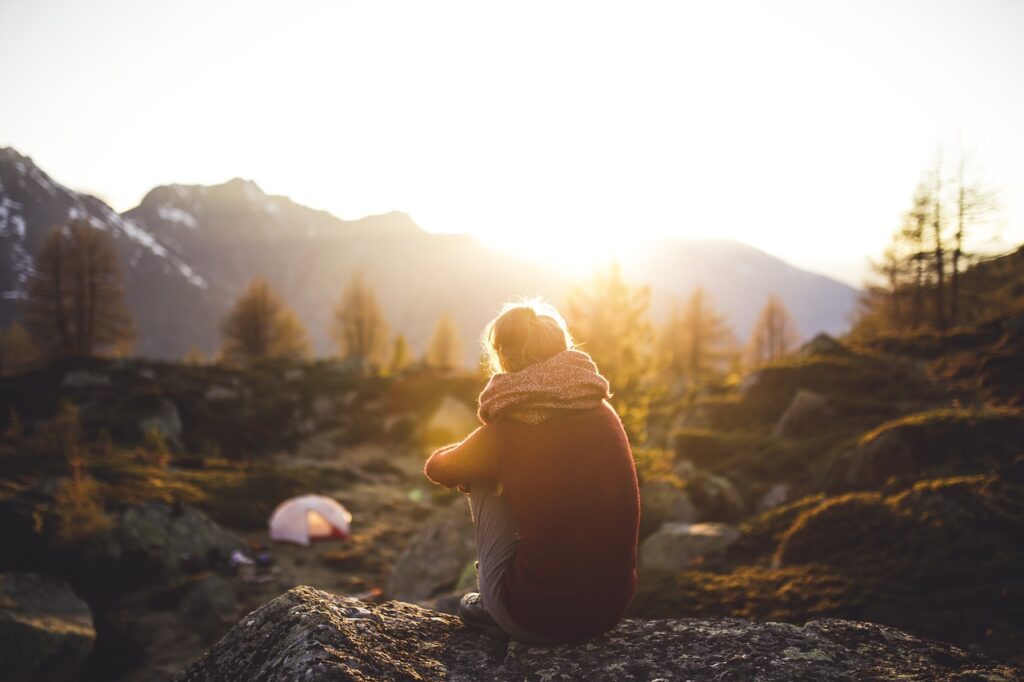
When you think of camping, it’s usually considered a group bonding activity. But camping alone can also be a fun and rewarding experience. Some of the benefits of a solo camping trip are the opportunity to escape your everyday life and practice mindfulness while you relax, explore, and connect with nature at your own pace.
Sometimes, camping alone is just easier for your mental health. You can avoid coordinating schedules or stressing over having enough gear, food and sleeping bags. You get to be responsible for your own meals, meaning you get to eat what you want, and you can choose all of your favorite relaxation activities.
If you think you’re ready for the exciting challenge of camping on your own time, learn about the benefits of solo camping with this Solo Camping Checklist:
The Best Benefits of Solo Camping
Camping is an awesome activity to share with family and friends. But trekking out into the woods for a solo camping trip offers the solitude that a group camping trip simply doesn’t have. Even just a weekend trip to the woods can do wonders.
When you camp alone, you will spend your time around the fire reflecting on life rather than sharing stories, but your time will have great value regardless. Below are the benefits of solo camping for beginners.
1. Going at your own pace
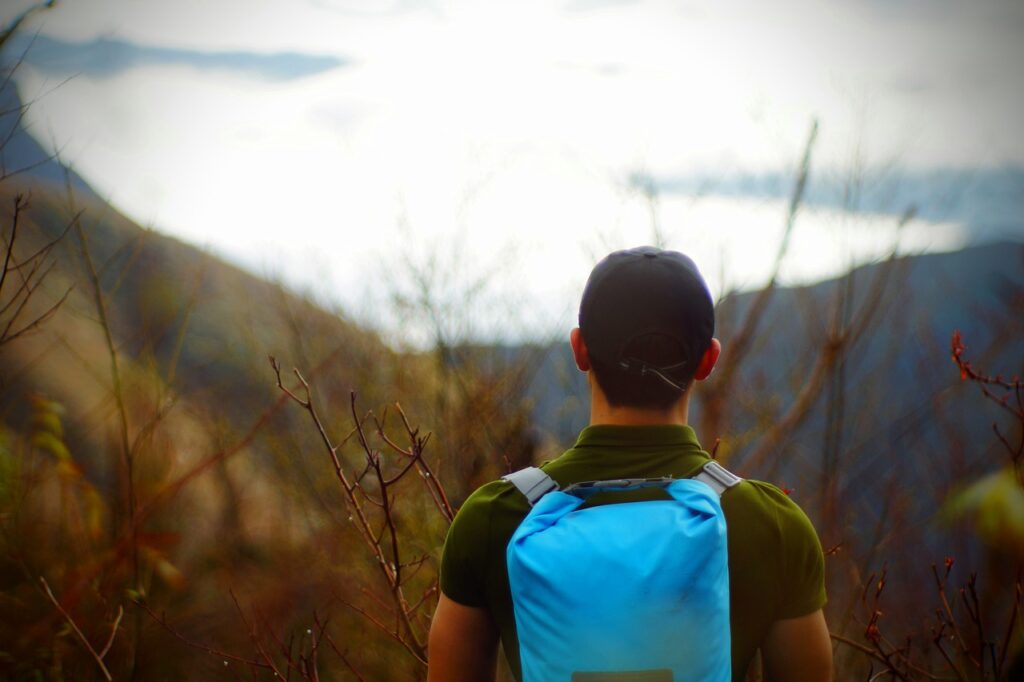
While you go hiking with a group or take part in another rigorous activity, people have their own expectations about how fast or how far you will go. With a large enough group, what happens most of the time is that people break off into smaller groups or couples and go at different paces.
It’s hard to find a group where everyone is at the same fitness level. When you camp alone, it becomes unnecessary to coordinate activities with others. You can go freely without planning to regroup at a certain time and go at your own pace when you want. You can hike quickly or slowly and stay up as late as you choose.
2. Make a stronger connection with nature
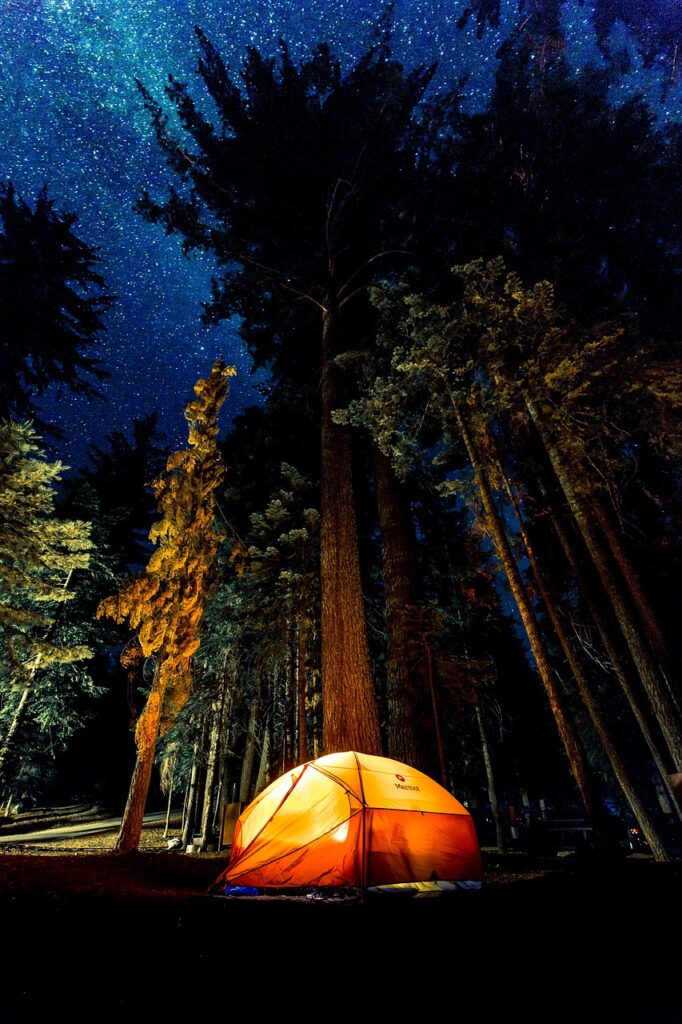
When camping in a group, you get caught up in conversations and have opportunities to create stronger emotional connections. You have to make sure everyone stays happy during the trip and arrange food and rest breaks. You end up spending a lot of your energy bonding with the people in your group.
A benefit of a solo camping trip is you can connect with nature without having others around to distract you. This can lead to elevated awareness and a deeper connection. You have everything around you to see and experience without the noise and disruptions. You might even find that you appreciate the scenery more when alone.
3. Increased self confidence
When you camp with a group, others are there to do tasks you feel uncomfortable with. Maybe you lack experience with equipment or don’t have the technical skills. This is why camping alone can be a challenge, but also a huge confidence boost. The pride you feel when learning new skills is a great benefit of a solo camping trip.
When camping alone, you have only yourself to rely on. You have to make sure you packed all of the correct supplies and be ready to improvise if you forgot to bring something. You learn to trust yourself more by going on an adventure alone.
4. Learn to camp like a pro
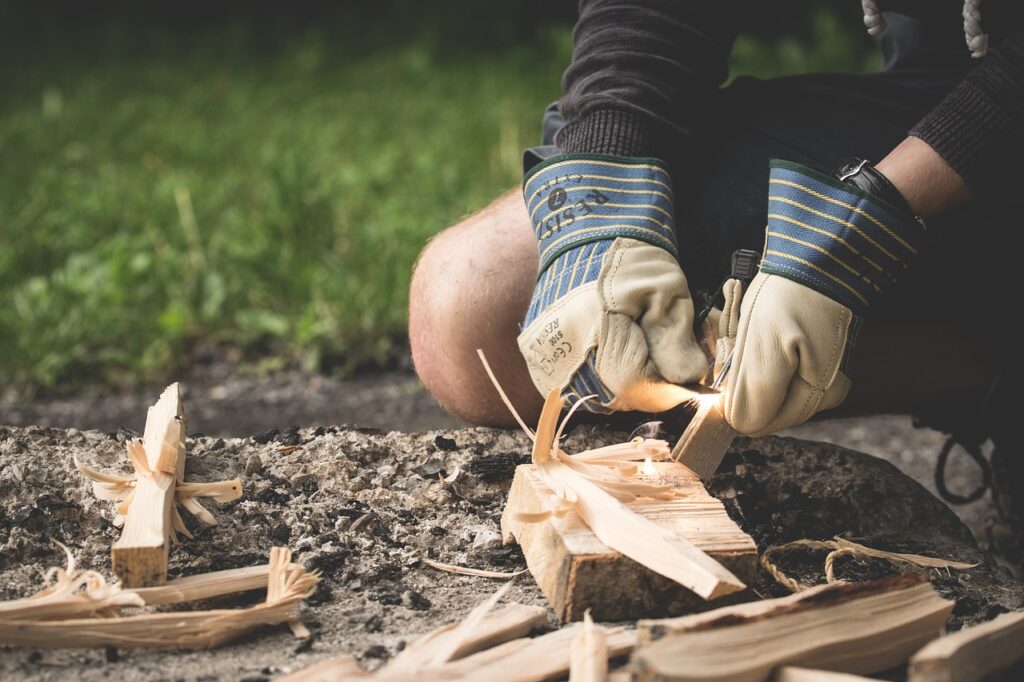
When camping in a group, one person usually becomes the leader and does most of the work. It is common to see someone setting up the tents on their own. Maybe another person always takes the initiative to start and tend to the campfire. You might even have someone with a very good sense of direction.
When you camp solo, all responsibilities are up to you. Having to do everything is how you can actually learn the most about camping. It will put you outside of your comfort zone and force you to be more independent than you would normally be.
The sense of accomplishment is an awesome benefit a solo camping trip. You will never be the same after watching the sun rise over the horizon from the campsite that you made while sipping the coffee that you just brewed over the campfire that you started.
5. Fewer potential stressors
Camping with friends or family can make for a stressful situation. Making sure everyone in your group stays safe and gets along are always a concern in a camping party. One disagreement or incident can weigh heavily on the experience.
Camping alone might have certain stressors, but you can avoid the typical ones you may have when surrounded by other people. The health benefits of allowing yourself to relax away from the social stress of the outside world is another benefit of a solo camping trip.
Top First Time Solo Camping Tips
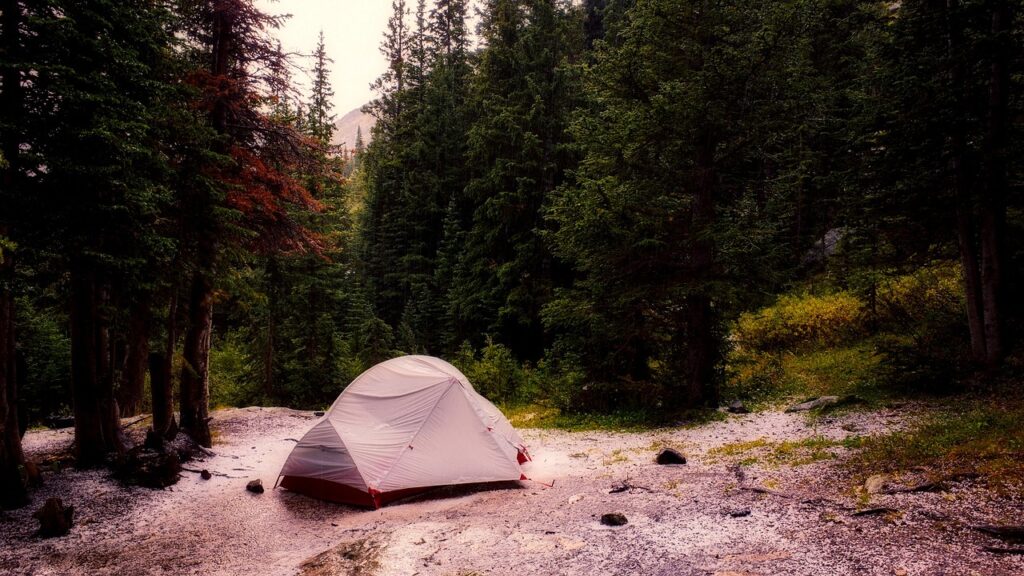
Now that you know the fantastic benefits of a solo camping trip, you are almost ready to embark on your journey and reap all the rewards of this time to yourself. However, there is still more to gain. Below we have listed solo camping tips you can follow to ensure your camping trip is safe and enjoyable.
1. Work your way up to going solo
Your first solo camping trip should not be to some vast wilderness area. As they say, practice makes perfect, and you don’t want to overwhelm yourself your first time out. Solo camping requires a lot of different skills and starting out small is the best route to take.
Solo camping is best for those who have been camping with a group many times before. It is also a good idea to go solo camping in familiar areas that you know well to limit the possibility of getting lost or encountering an unexpected danger.
Slowly work your way up to more difficult camping situations. For example, if you want to work on your fire-starting skills, it is best to bring some backup tools in case you have trouble with your flint. Even skilled campers sometimes run into issues, so it’s best to learn basic skills first.
It won’t take long before you find yourself taking longer trips into more wild places, but make sure your skills are up to speed first.
2. Feel confident about your camping skills
Knowing the basics is vital to camping alone, but you need to feel like your skill level goes beyond that of a beginner’s.
To successfully camp alone, you need to know how to do these important solo camping activities:
• Navigate
• Pitch a tent
• Build a fire
• Clean water, in case your supply runs out and you need to rely on creek water
• Set up camp
• Handle run-ins with wildlife, including big predators like bears
• Forecast weather so you do not end up stuck in a storm
• Deal with injuries and other things requiring first aid
Other things would be great to know before going out on your own, but the above list is the bare minimum you must be able to check off before you even think about heading out solo.
3. Go longer than a night or two
Sleeping alone in the wilderness is going to be uncomfortable. You’re somewhere new and unfamiliar and you’ll have a lot on your mind to worry about. If you are only giving yourself a night or two on your solo adventure, then you’re not going to reach the level of full enjoyment you’re after.
After a couple of restless nights, you’ll finally reach a point where you either become more comfortable or just so exhausted that you will be able to sleep much better.
4. Lighten the load
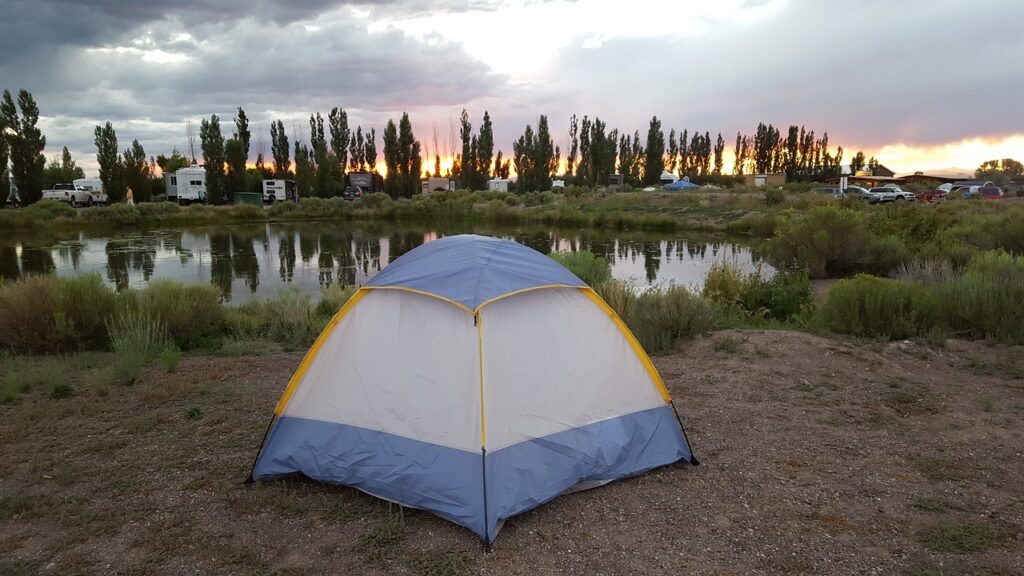
Since you’ll be the only person there to pack things in and out, be mindful of what you bring. You only need enough for yourself, so be realistic about what you pack for your camping.
Rather than lugging in a tent and a sleeping pad, many solo campers opt for a hammock that only requires the addition of a sleeping bag. If you prefer a tent, pick a lightweight one meant for one person.
5. Choose a close location
As a solo camping beginner, it is a good idea to pick a spot close to your home or one that is familiar. The further you go from what you know, the more distance you put between yourself and people who can help you. Memorized trail systems and the comforts you already know can reduce your stress on your first solo trip.
Before going on your trip, head out to the area for a day hike or a bike ride to scout it out and get a feel for it. Knowing your camping area well will be an enormous help in you feeling comfortable and relaxed. You want to reduce the number of unwanted surprises to make your trip as enjoyable as possible.
6. Learn to calm you mind
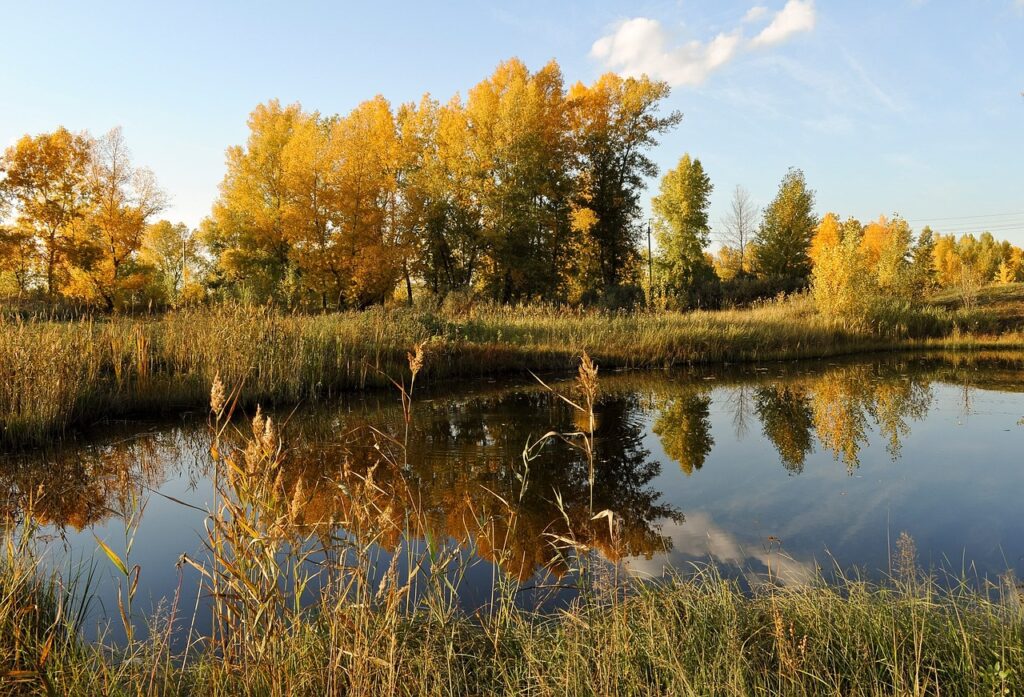
One of the largest obstacles of solo camping for many people is being alone in the woods, especially at night. As soon as the sun goes down and it is time to crawl into your sleeping bag, every snapping twig will still make you jump. Over time, you’ll learn to recognize the sounds of the forest, and your comfort level will only increase.
There is no concrete solution to getting over those fears, and they will probably always remain to some degree. Spending time alone in the woods is the only way to get more comfortable. You will develop your own strategy for coping with camping anxiety. After some time you will mentally reassure yourself that everything is okay. If you start to feel overwhelmed from the panic setting in, give yourself a pep talk out loud. Hearing your own voice aloud will ground you in the moment and no one else is around to hear you anyway.
Once you are at a point where you’re confident in your solo camping skill set, you can start to add additional activities to your adventures. Kayaking and mountain biking are two great ways to add more excitement and fun to a solo trip into the wilderness.
7. Share your plans with someone
This is advice you will find in any camping guide: always tell someone. Tell someone you trust where you are going and what your camping itinerary looks like before leaving for a solo camping trip. Always give somebody a heads up before heading into the woods.
If something were to go wrong, knowing that someone can send help is a huge relief. This way, you can avoid a situation where you have to rely on your cell phone during an emergency. At the very least, someone needs to know the day you are leaving, the day you are coming back and where you are going.
8. Take safety precautions
When you’re out in the wilderness alone, it’s always better to be safe than sorry. Bring some sort of emergency device, satellite phone or a personal locator beacon with you. A satellite phone is a great way to check in with friends or family back home once in a while so you can assure them you are safe.
If you plan to hike or explore the area around your campsite while solo camping, make sure not to take any unnecessary risks. An injury as simple as a sprained ankle will be something you simply won’t want to deal with. Remind yourself to move slow and deliberate through the environment to minimize your risk of injury and allow you to really appreciate the beauty of nature, safely.
9. Bring a form of entertainment
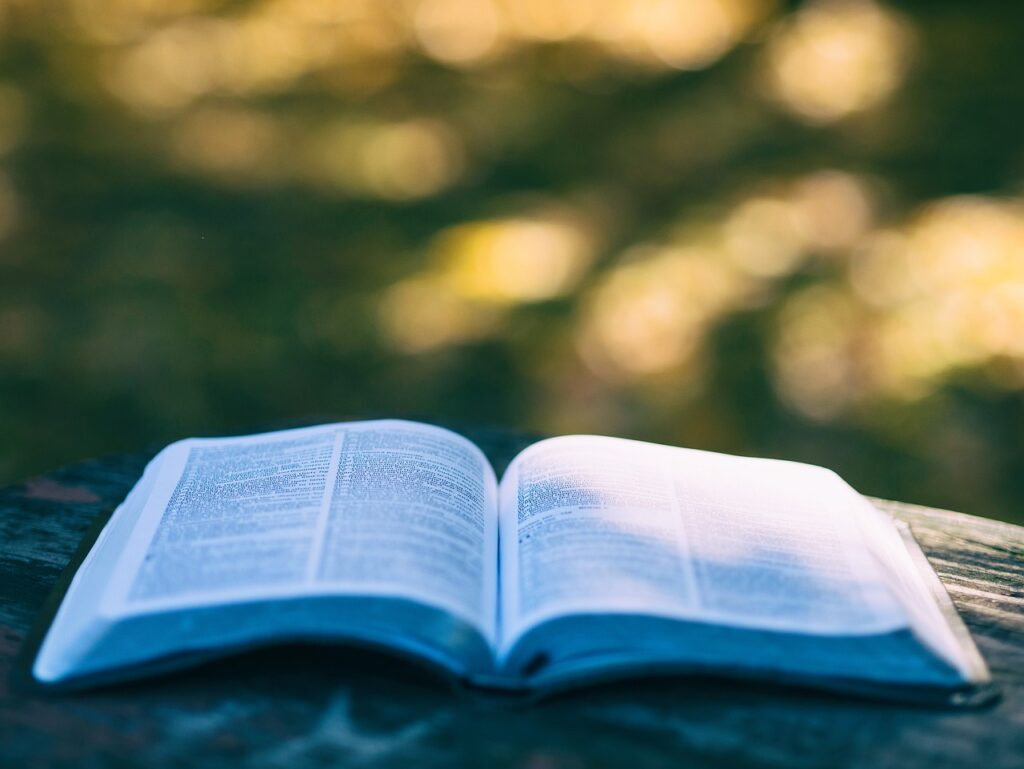
Solo camping will also provide you with a lot of free time. What camping alone checklist would be complete without reminding you to bring something to read? The camping time that is usually filled with conversation and storytelling when with a group won’t exist when you’re alone. You will probably be surprised at the amount of silence and spare time you’ll have. To help keep yourself company, bring along a good book. This will also serve as a great aid in helping you get to sleep.
A crossword puzzle or a camping journal can be a great way to fill down time. A bird guide and set of binoculars are also a great interactive way to pass the time.
10. Go without the electronics
If solo camping wasn’t challenging enough, you could add another. Try leaving your electronics in your bag. Not only will you probably lack good reception on your trip, but actually focusing on your surroundings is one of the best ways to recharge your mental batteries. You will miss your favorite T.V. show less once you learn to appreciate the sounds of nature.
Unplugging from our increasingly tech-dependent society is vital to our collective wellbeing. The constant barrage of emails, text messages, alerts and social media updates can negatively affect your outlook on life. The initial lack of those things while camping on your own may come as a shock at first, but before long, you might discover that it brings you a newfound inner peace.
11. Your safety comes first
Always plan ahead when you go on a camping trip, but a solo trip makes this all the more important. You will be entering the wilderness alone so you need an escape plan. Know the best way to get out and the nearby areas you can go to for help if needed. Make sure you know what safety precautions to take, such as if you are in bear territory, and know who to contact for emergency services.
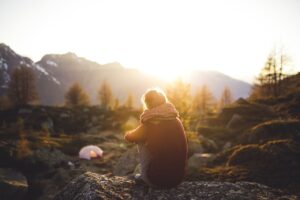



[…] in highly detailed route documentation. This Information can be vital, especially if you are hiking or camping alone and need […]